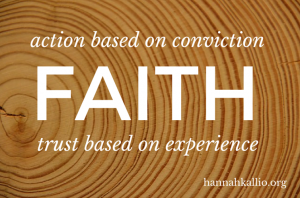‘Faith’ is a word we all use and think we understand. But what’s God’s definition of faith? How does that definition change the way we live today?
How can we know the meaning of ancient Hebrew words?
In our culture, words are abstract combinations of symbols, disconnected from their meanings. Meanings change over time, and vary from person to person. In ancient Hebrew culture, each character of every word had concrete meaning. They represented sounds and ideas (like hierglyphics). We can experience these meanings with our five senses.
What does ‘Faith’ really mean?
Most dictionaries base their definition of faith on trust. Faith and trust are related, but I hope to convince you there’s more. Several dictionaries define faith as “Belief that is not based on proof”. Most believers in the West agree. They use II Cor. 5:7 “For we walk by faith, not by sight.”as the basis for their interpretation.
This idea of “blind faith” isn’t biblical. Hebrews 11:1says faith is “the substance of things hoped for, the evidence of things not seen.” The ancient Hebrew word translated as ‘faith’ is אֱמוּנָה. It’s composed of five characters, each adding a layer of meaning. One symbolizes strength. Another represents continuance. One represents seed (agriculturally and biologically), and another means to pay attention.
Let’s focus on the central letter, because in Hebrew the central character of each word reveals its essence. In this case, that character represents a tent stake. It depicts the act of driving a tent stake into the ground. So the ancient Hebrews understood faith as an action, based on experiences everyone related to.
Imagine living in ancient Israel. Every time you pitch your tent, you drive the stakes into the ground, because you believe they will support your tent. You believe this because you’ve lived in a tent your whole life, and the stakes have always supported the tent. Faith is action based on conviction, trust based on experience. If we pay attention , our actions provide strength and security for the next generation.
When the Bible says Abraham “believed” God, it’s not describing an abstract thought process. It’s saying Abraham pitched his tent where God told him to pitch it. Faith doesn’t always contradict sight. Faith is walking according to the decision we’ve made to follow God (which is still based on evidence) rather than what we currently see.
How does this apply to us?
A very successful business coach told me, “You need to put a stake in the ground and let people know what you stand for”. She didn’t share my faith, but without realizing it, she illustrated what faith means in my life.
This message is very personal for me. When people hear our story, they often say they admire our faith, our willingness to go in spite of uncertainty. But the uncertainty isn’t what makes it faith. Faith is acting on our experience of God’s faithfullness to us so far.
It isn’t something we have, it’s something we do. It’s the substance of what we hope for, the evidence here and now.
What action will you to take in response to your experience of God’s faithfullness?
